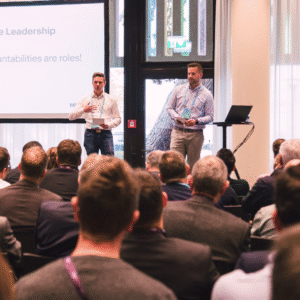AI adoption isn’t just a technological shift but one on mindset. During our second Lunch & Lead session, we invited the community to join experts Alessandro de Giulli (Sunrise), Andreas Giesa (Xebia) and Miriam Daschel (Accenture) to explore what it takes to move from experimentation to real impact. While enthusiasm around AI continues to grow, many organisations are still stuck in hesitation. There’s an uncertainty of what to automate, how to govern it, and how to bring their people along.
From Fear to Fluency
As several speakers noted, the barrier isn’t always technical. It’s often emotional and structural. Alessandro observed, “People have great ideas, but they’re scared. Sometimes they also expect AI to create magic. The key is to approach it piece by piece.”
Human oversight remains critical. Even as AI agents take over certain coding tasks, seniors must review the output to ensure quality and adherence to standards. Alessandro added, “The answer is not replacing humans but rather empowering them.”
One panellist likened onboarding AI to onboarding a new employee:
“Agents need context, access limitations, and clear responsibilities- the same principles we apply when bringing a person into a team.”
Beyond Volume – The Shift to Value
Many companies are rethinking how they measure success. Instead of contracts based on transaction volume or ticket handling, there’s a move toward value-based partnerships. Miriam emphasised:
“Efficiency gains should be tied to joint outcomes and collaborative work, not just fees. This is how AI integration becomes meaningful.”
This shift also requires alignment with customers and vendors. Fear can block collaboration; establishing transparency and clear expectations early helps ensure AI adoption benefits everyone involved.
Designing Governance that Enables, Not Limits
Governance frameworks shouldn’t slow innovation; they should make it safer and smarter. Andreas noted, “It’s like onboarding a human, define the rules, train them, then let them operate. When something goes wrong, humans step in. The same applies to AI.”
Clear escalation paths, accountability, and structured oversight make AI adoption scalable while maintaining trust and reliability.
A culture built on trust and experimentation
Ultimately, technology only transforms an organisation when its people feel empowered to use it and leadership endorses it. Top management needs to confront the fear and lead by example, and only then can the rest of the organisation embrace experimentation safely.
The discussion ended on a clear note: empowerment beats fear. When people are included, guided, and trusted, AI becomes a tool to expand human intelligence rather than replace it. “It’s about choosing which tasks to automate and which to keep human”, Alessandro summarised.
These takeaways are just a small taster of the core themes that will be featured at Lead26. Hear from the experts on 19 November and explore further:
-
Doing Things Right in the Age of AI: A Leadership Story from Sunrise – In the age of AI, leadership goes beyond technology. Alessandro, along with Luca Gambini and Vincenzo Pecorella, share how Sunrise built a scalable, trustworthy AI system by empowering people, encouraging creativity, and embedding AI into the fabric of operations. Scattered curiosity undoubtedly turned into systemic execution.
- From ChatGPT to Androids: The Next Leadership Frontier– AI is transforming how we work, lead, and create value. Andreas will take the stage to discuss agentic process automation, AI copilots in software development, and upcoming robotic androids in production. Discover a blueprint for navigating change: start small, experiment boldly, and leverage emotional intelligence to convert AI-driven efficiency into meaningful human outcomes.




